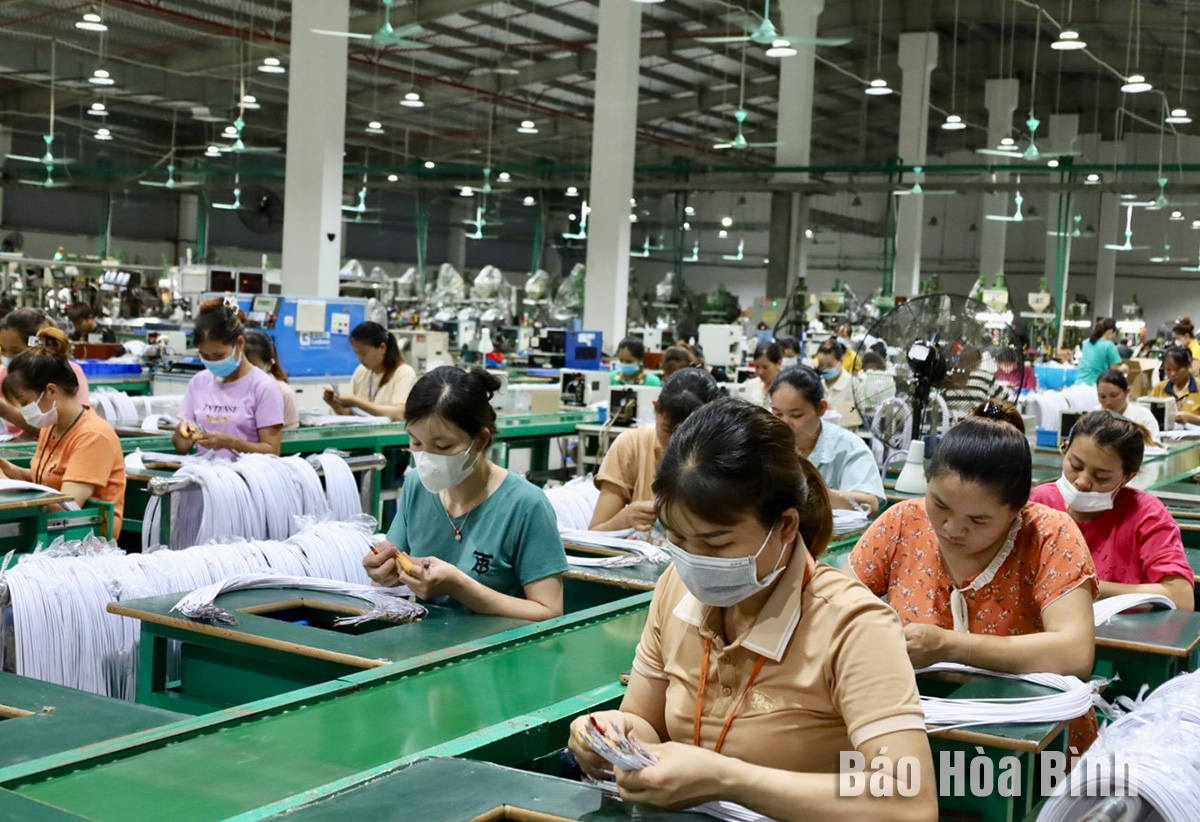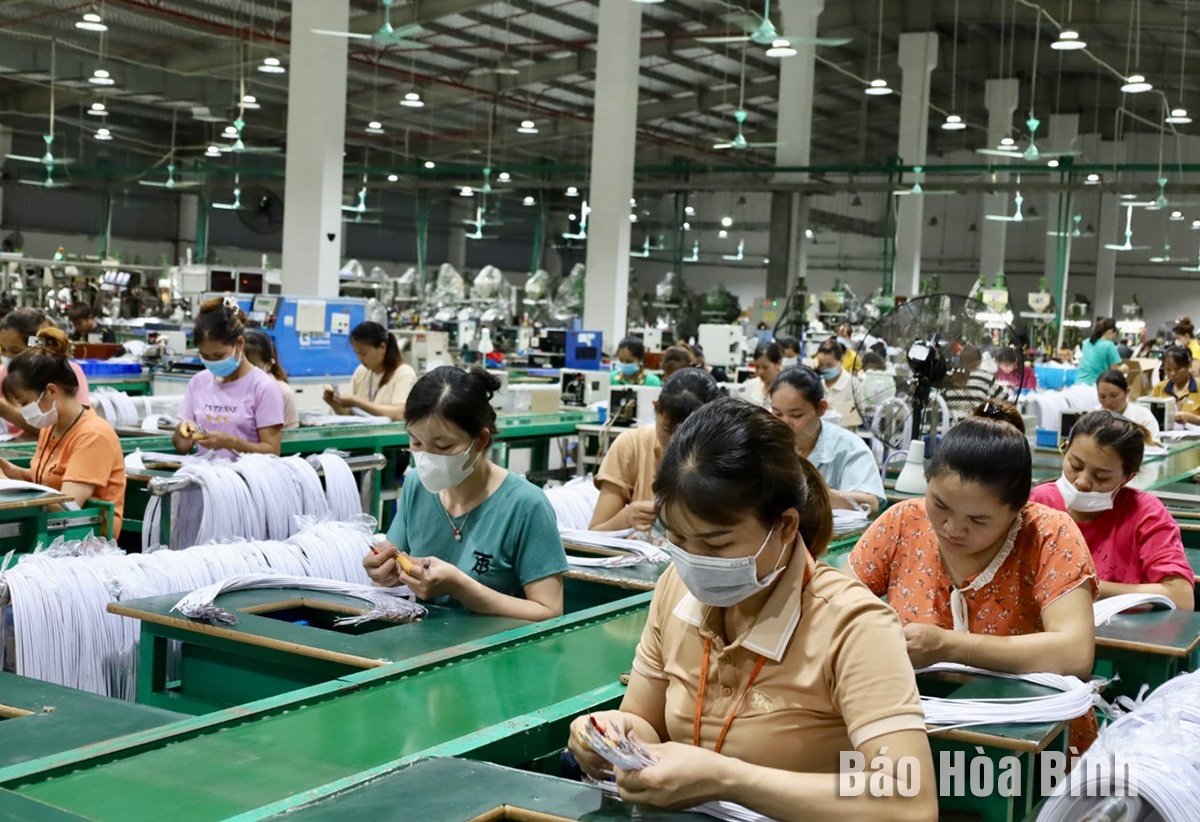
With a rise in number and improvement in production and business efficiency, companies, cooperatives, and business households in Lac Son commune have made important contributions to the transformation of economic structure and economic growth of the locality, creating jobs, joining hands in dealing with social issues, and helping increase State budget collection of the district.
Lac Son Electronics Co., Ltd. in Muong Voi street, Vu Ban town
of Lac Son has created jobs with stable income for 800 labourers.
Specialising in processing plastic products, Lac Son Electronics Co., Ltd with
two factories in Moi village of Van Nghia commune and Muong Voi street of Vu
Ban town has created jobs for more than 1,200 labourers, mostly locals.
Director Ha Thi Minh said that her company has received great support from the
local administration. The company has shown strong performance in implementing
its obligations to the State and labourers as well as in social welfare
activities, thus winning strong confidence from workers.
Nhung Van company, specialising in producing turmeric starch, was developed
from a business household. Bui Van Nhung, owner of the facility, said that
recognising the potential of the product and receiving good feedback from
customers, the firm has researched for more products and enhanced the quality
of its products to meet customers’ demands. The firm’s products have been
certified as four-star by the One Commune-One Product (OCOP) programme.
The company’s material region has been expanded, enabling local farmers to earn
60-75,000 million VND (2,421-3,026 USD) per hectare, said Nhung.
Statistics show that currently, Lac Son is home to 139 operating enterprises,
including 46 in the field of construction, 38 in trade, 11 in service, 30 in
manufacturing, seven in agriculture, and six in transport. The firm have
created jobs for more than 5,000 labourers.
Outstanding businesses include Lac Son Toys Co. Ltd., which is employing more
than 1,600 labourers, Thien Dieu Co. Ltd. with 800, and Lac Son Electronics
Co., Ltd. with 800.
Meanwhile, the district has 60 cooperatives with nearly 730 members, creating
jobs for 840 labourers, along with more than 5,700 business households. They
have paid about 4 billion VND (161,322 USD) to the State budget.
Bui Van Linh, Chairman of the People’s Committee of Lac Son, said that local
companies, cooperatives, and business households have made great contributions
to socio-economic development in the district, while actively engaging in
social welfare activities.
Last years, they paid 41.7 billion VND to the State budget, accounting for
40.8% of the district’s total collection. They have also helped improve the per
capita income of the district, which has reached 60.3 million VND per year.
Linh affirmed that the district will continue creating favourable conditions
for local companies, cooperatives, and business households to develop, while
designing support policies for them and assisting them in deal with
difficulties, and speeding up administrative reform.
According to data from the Hoa Binh Provincial Party Committee, the industrial production index for the first six months of 2025 is estimated to have increased by 20% compared to the same period last year. This marks the highest year-on-year growth rate for this period since 2020.
In the first six months of 2025, Hoa Binh province’s export turnover was estimated at 1.145 billion USD, marking an 18.11% increase compared to the same period in 2024. Import turnover was estimated at $ 804 million, a 17.15% increase, which helped the province maintain a positive trade balance.
The lives of the ethnic minority farmers in Tan Lac district have gradually improved thanks to the new directions in agricultural production. This is a testament to the collective strength fostered through the professional associations and groups implemented by various levels of the district’s Farmers’ Union.
With the motto the "product quality comes first,” after nearly one year of establishment and operation, Muong village’s Clean Food Agricultural and Commercial Cooperative, located in Cau Hamlet, Hung Son Commune (Kim Boi district), has launched reputable, high-quality agricultural products to the market that are well-received by consumers. The products such as Muong village’s pork sausage, salt-cured chicken, and salt-cured pork hocks have gradually carved out a place in the market and they are on the path to obtaining the OCOP certification.
In the past, the phrase "bumper harvest, rock-bottom prices" was a familiar refrain for Vietnamese farmers engaged in fragmented, small-scale agriculture. But today, a new spirit is emerging across rural areas of Hoa Binh province - one of collaboration, organisation, and collective economic models that provide a stable foundation for production.
Maintaining growing area codes and packing facility codes in accordance with regulations is a mandatory requirement for agricultural products to be eligible for export. Recently, the Department of Agriculture and Environment of Hoa Binh province has intensified technical supervision of designated farming areas and packing facilities to safeguard the "green passport" that enables its products to access international markets.



